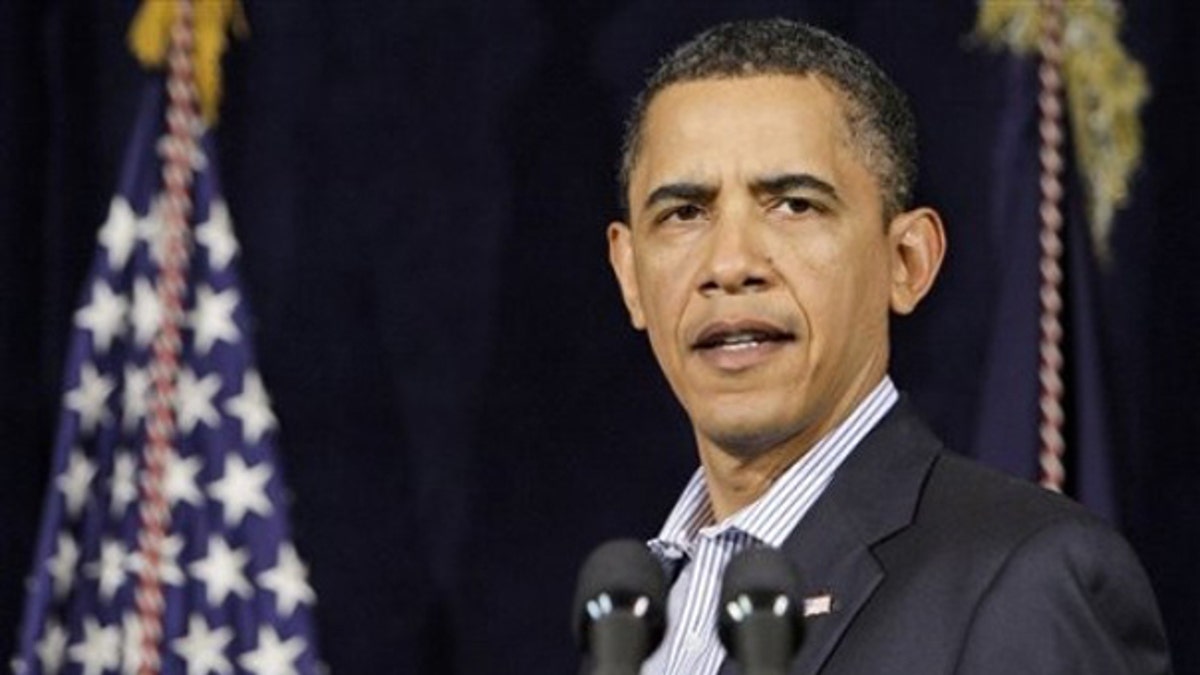
President Obama speaks at Marine Corps Base Hawaii in Kaneohe Bay Dec. 29. (AP Photo)
President Obama took office promising a new era of bipartisanship, a wave of international cooperation and a full plate of domestic reforms touching everything from health care to immigration.
That was last year. The Obama of 2010 looks to be a little less idealist, a lot more realist.
The president already has taken a harder edge toward the world in his recent speeches, as he defends his decision to escalate the war in Afghanistan in the face of pressure from the left. On diplomacy, the administration is changing its tone toward countries like Iran. And analysts say that the looming midterm elections next year -- expected to be painful for Democrats -- will cause Obama to choose his battles more carefully.
They expect the president will focus on two key areas, national security and the economy, and enter 2010 with a far leaner portfolio than last year, realizing that on most domestic items Republicans will not be on board.
"There is a lot to juggle," said Richard Socarides, a former adviser to President Clinton. "It's very difficult."
The president was criticized for taking on too much at once his first year in office. Though he notched several victories -- a stimulus package, a step toward financial reform, big steps toward health care reform -- the persistently high unemployment rate and increasing threats from terrorists have made the president's other agenda items seem less pressing and, to some, indulgent.
Obama's approval rating has plummeted 20 percentage points since Inauguration Day. And his signature issue, health care reform, has proved politically exhausting. While he's ushered the bill through major hurdles, including votes in the House and Senate, and many expect the legislation to ultimately reach his desk, only one Republican voted for the bill on the floor. Democrats struggled to hold together their coalition in both chambers.
The political pragmatist in Obama came through during that debate. Obama's concessions, notably a willingness to accept a bill that does not include a government-run insurance plan, show he's more interested moving forward on the issue than holding out for a bill that would fully realize his campaign vision.
Republicans said they expect issues like a cap-and-trade climate bill and immigration reform to fall off the radar in 2010.
"I think ... the Democrats are not going to have an appetite again for a big-ticket item when there's such dysfunctionality within their own ranks," said Brad Blakeman, former adviser to President Bush.
"The Democratic Party is really running head-on into the polls these days, and the idea that David Axelrod is going to let Barack Obama do that for another 10 months into the next election cycle just doesn't seem plausible to me," Fox News contributor Jonah Goldberg said.
Socarides said he expects Obama will make an attempt on issues like immigration reform and climate change.
"I think they are thinking about these issues and trying to be clever about a way to tackle some of them in a way consistent with what he said during the campaign," he said.
But he added that national security and the economy have to take precedence, given that unemployment is still at 10 percent and last week's attempted bombing of a Northwest Airlines flight exposed potential gaps in the intelligence infrastructure.
Obama already has started to pivot toward both those issues. He held a jobs summit at the White House in December and proceeded to outline his ideas for a new jobs creation package, though the administration will not refer to it as a "stimulus," which in some circles is a politically toxic term.
And in the aftermath of the attempted bombing, the president initiated a full review of airport screening and the terror watch list system, declaring a "systemic failure" allowed the suspect to board a plane bound for Detroit armed with explosives.
The president was taking a tougher tone on national security before the attempted attack.
After an exhaustive review process, Obama ordered 30,000 more U.S. troops to Afghanistan and increasingly has emphasized the importance of new fronts in Somalia and Yemen. The White House approved an expansion of the CIA's controversial drone program in Pakistan. And his speech in Oslo accepting the Nobel Peace Prize essentially was a rebuke to pacifism -- and contained more than a few echoes of George W. Bush.
"I face the world as it is, and cannot stand idle in the face of threats to the American people," Obama said. "For make no mistake -- evil does exist in the world."
He continued: "To say that force may sometimes be necessary is not a call to cynicism -- it is a recognition of history, the imperfections of man and the limits of reason. ... The belief that peace is desirable is rarely enough to achieve it."
As he escalates the war, his administration is contemplating a new tone on diplomacy with America's fiercest critics.
Obama ended the year with leaders from Cuba, Venezuela and Iran all condemning the United States, though the president and his team tried to improve ties with those nations all year.
National Security Council chief of staff Denis McDonough said this week that the administration is now reaching out to international allies in an effort to build support for a new round of sanctions against the regime.
Iran's leadership persistently defied the administration's year-end deadline to strike a deal on reining in its nuclear program. White House Press Secretary Robert Gibbs said recently that that deadline is "very real."











































